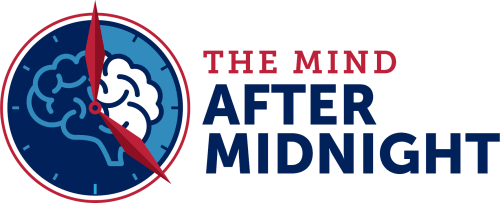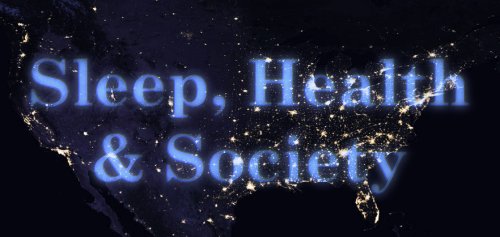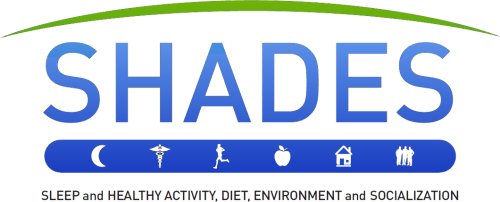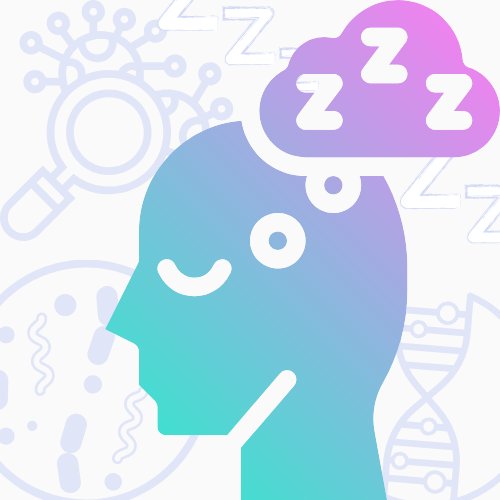 Research Projects
Research Projects
Our lab has a large number of research projects!
Here is a list of most of the projects we are currently working on:
Here are the projects that are no longer running, but we may still be performing analyses and generating publications:

The Mind After Midnight
This project aims to explore the "Mind After Midnight" hypothesis at home and in the laboratory. Co-led with Dr. Fabian-Xose Fernandez (University of Arizona Department of Psychology), we will be recuiting adults who are interested to see what happens to cognitive-affective functioning in the middle of the night. We will be studying these individuals at home in their normal living situation, and then bringing them into the lab (twice) to look at brain function, biological samples, and performance on a number of cognitive and emotional assessments at different times of the day and night.
Collaborators on this project include Dr. Michael Perlis (University of Pennsylvania), Dr. Scott Killgore (University of Arizona SCAN Lab), Dr. Jordan Karp (University of Arizona Department of Psychiatry), and Dr. Jamie Zeitzer (Stanford University).
This work is funded by the National Institute of Mental Health.

Nogales Cardiometabolic Health and Sleep (NoCHeS) Study
This projectaims to understand sleep health at the US-Mexico border, the social, behavioral, and environmental factors that play a role in sleep health in this region, and the impacts of sleep on risk for cardiovascular disease and diabetes. This study will enroll about 1,100 people from the Nogales, AZ area. This study is being conducted in partnership with the Mariposa Community Health Centers and the promotoras de salud program.
Other researchers involved with this project include Dr. John Ruiz (University of Arizona College of Science), Dr. Patricia Haynes (University of Arizona Mel and Enid Zuckerman College of Public Health), Dr. Sairam Parthasarathy (University of Arizona College of Medicine), Maia Ingram (University of Arizona Prevention Research Center), Dr. Orfeu Buxton (Penn State University), and Dr. Sanjay Patel (University of Pittsburgh).
We are currently recruiting for this study! If you are an adult and live in Santa Cruz county in Arizona, you may be eligible. If you have any questions, contact us.
This study is funded by the National Institute on Minority Health and Health Disparities of the National Institutes of Health (R01MD01160).

EBB/FLOW: Examining Blue Blockers For Light Optimization and Wearability
This project has two parts. First, we examined the spectrophotometric properties of a wide range of commercially-available blue-blocking glasses, under a range of conditions. See the results here.
Next, we will be deploying various glasses in real-world conditions to better understand how they are used, how they impact sleep and circadian rhythms, and how they impact functioning and productivity.
Collaborators on this work include Dr. Fabian-Xose Fernandez (University of Arizona, Department of Psychology), Dr. Lauren Hartstein (University of Arizona, Department of Psychiatry), Dr. Scott Killgore (University of Arizona, Department of Psychiatry), and Dr. Stanley Pau (University of Arizona, Department of Optical Sciences).
This work is supported internal grants from the University of Arizona.

Platicamos Sueno
This project represents a collaboration with the Mariposa Community Health Centers in Santa Cruz County, Arizona. We will be working with the Promotoras de Salud, trained community health workers, to learn more about how they think about their own sleep health. Then, we will develop educational materials that will help them improve their own sleep. They can then go into the community to disseminate what they have learned.
Collaborators include Patricia Molina from Mariposa.
This work is funded by Harmony Biosciences.

DABITS: Danieli-Arizona Border Intergenerational Transmission of Stress
The original Danieli Inventory was a comprehensive assessment -- the first of its kind -- to assess how individuals pass on stress and trauma. It was originally developed for holocaust survivors and their families. This effort was undertaken to adapt this inventory towards a US-Mexico border community to identify how people in this region pass stress and trauma on across generations, and how this impacts sleep health, cardiometabolic health, and mental health.
This work was funded by the National Institute of Minority Health and Health Disparities.

Hawaiian Islands Sleep and Health Study
This study aims to provide important information about how sleep health is related to social environmental stress, as well as cardiovascular and metabolic disease risk among Native Hawaiians and other Pacific Islanders living on Oahu. This work is being conducted in collaboration with Dr. Julie Takishima-Lacasa on Oahu.
This study is currently ongoing and recruiting from the Oahu community.
This study is funded by the National Institute of Minority Health and Health Disparities at the National Institutes of Health.

Hypknowledge: Technology Development and Validation
This project involves the development and refinement of a tech-based strategy for improving real-world sleep. Many individuals might want to get more, better sleep but may not know how to achieve this. The hypknowledge platform is designed to take real-world people (without sleep disorders) and help them optimize their sleep. It uses sleep tracking strategies and a decision engine to predict what small change an individual should make to their sleep, with the goal of eventual sleep optimization. It uses a set of algorithms to to optimize sleep slowly over time and is individuallytailored, self-correcting, and able to be deployed at scale. We are currently working on further refining and testing this platform.
This work is in collaboration with Dr. Michael Perlis (University of Pennsylvania).
Another hypknowledge trial will be starting up soon!
This work is funded by the University of Arizona and the University of Pennsylvania.

Sleep and Health in Society
Secondary analysis of population-wide data for the purpose of characterizing sleep problems in the general population, as well as identify disparities in sleep health and examine relationships among these disparities and other health outcomes. More specifically, predictors of sleep disturbance from the sociodemographic domain (e.g., gender, age, ethnicity, income, education, marital status, employment), mental health (e.g., depression, anxiety, quality of life) and health (e.g., heart disease, diabetes, stroke, smoking, exercise, alcohol use) are being investigated. Analyses ongoing.
Current projects are utilizing several existing datasets, including the Behavioral Risk Factor Surveillance System (BRFSS), the National Health and Nutrition Examination Survey (NHANES), the National Health Interview Survey (NHIS), the National College Health Assessment (NCHA), the National Violent Death Reporting System (NVDRS), and other datasets.
Completed Projects:

Wellness Intervention for Smoking and Health (WISH) Study
This project aimed to improve smoking cessation efforts in adults with HIV. This study compared two different strategies -- both of which include free access to a 15-week smoking cessation program overseen by a psychologist, as well as medical treatment with verinicline. In addition to this, participants also received either an additional general health promotion intervention or a specific sleep health promotion intervention. We assessed whether the sleep program differs from the regular health program in terms of promoting quitting and absitinence from smoking. We also evaluated the effects on health and daytime function.
This study is co-led by Dr. Grandner, Dr. L;ori Fantry (University of Arizona, Division of Infectious Diseases), Dr. Elizabeth Connick (University of Arizona, Division of Infectious Diseases) and Dr. Freda Patterson (University of Delaware).
Data analysis is ongoing.
This study was funded by the National Institute on Drug Abuse (R01DA051321) of the National Institutes of Health.

Addressing Nocturnal Sleep-Wake Effects on Risk for Suicide (ANSWERS)
This project includes several studies aimed to explore relationships between suicide risk and aspects of sleep-wake rhythms. In particular, we are exploring how sleep-related issues are important suicide risk factors and how these issues confer risk. We are specifically focusing on nocturnal wakefulness as a novel risk factor for suicide risk. This project focuses on the "Mind After Midnight" hypothesis.
Several studies included in this project are:
- Population-level analysis of sleep-wake factors in suicide risk, using existing datasets such as the National Violent Death Reporting System, the National Health Interview Survey, and others.
- ANSWERS-OA trial, examining the efficacy of an online insomnia intervention for reducing nocturnal wakefulness and suicide ideation in older adults.
- ANSWERS-College study, examining relationships between sleep-wake factors and suicide and self-injury risk factors among college students.
- ANSWERS-MSRC study, examining relationships between sleep-wake and suicide-related risk factors in military populations.
This work is co-led by Dr. Grandner, with Dr. Fabian-Xose Fernandez (University of Arizona, Department of Psychology) and Dr. Michael Perlis (University of Pennsylvania). Collaborators include Dr. Jordan Karp (University of Arizona, Department of Psychiatry), Dr. Scott Killgore (University of Arizona, Department of Psychiatry), Dr. John Allen (University of Arizona, Department of Psychology), Dr. Elizabeth Klerman (Harvard University), Dr. Darren Mansfield (Monash University), and Dr. Subhajit Chakravorty (University of Pennsylvania).
Aspects of this work have been funded by the National Institute of Aging of the National Institutes of Health, the Department of Defense, and internal grants from the University of Arizona.

Investigating Neurocognitive Behaviors after Dark (IN-BeD) Study
This project further explores the "Mind After Midnight" hypothesis by examining how we think, feel, and make decisions about a wide range of things differently at different times of day. In this study, young, healthy people will be brought into the lab to be tested at different times in the 24-hour day, to examine natural rhythms. This will be explored under 2 different sleep conditions. We will also be exploring how regular, real-world sleep habits out of the lab also relate to the issues we are studying.
his work is co-led by Dr. Grandner, with Dr. Fabian-Xose Fernandez (University of Arizona, Department of Psychology), Dr. Marie-Pierre St-Onge (Columbia University), and Dr. Michael Perlis (University of Pennsylvania).
This work was funded by grants from the University of Arizona and Sleep Research Society Foundation.

FAMILISMO: The Family Sleep Health Study
This study aims to provide important information about how sleep health exists at the family level. In partnership with a nutritional science collaborator (Dr. Ann Skulas-Ray), this intevention was developed by Dr. Suzanne Gorovoy in our program. She worked with promotoras affiliated with the Mariposa Community Health Center, in collaboration with Patricia Molina, to develop a family health plan that included both sleep and nutritional elements. While most interventions focus on the individual, this was one of the first to address the family unit itself as the point of intervention. Data analysis is ongoing.
This work was funded bya grant from The University of Arizona with additional funding by Harmony Biosciences.

Project REST: Recovery Enhancement and Sleep Training
We are examining a novel set of strategies for improving real-world sleep health in college students who are overworked, overscheduled, and have difficulty getting optimal sleep. These strategies include education, online learning, tracking, peer support, and other elements to provide a comprehensive, adaptable, flexible sleep promotion program.
Due to COVID, all Project REST programs are currently paused. We hope to restart these programs soon!
These studies are funded by the National Colleguate Athletics Association Sport Science Institute and/or the University of Arizona.

Phototherapy Observational Trial to Optimize Neurorelaxation and Sleep (PHOTONS) Study
This project aims to test a new device to determine whether it is useful for promoting neurorelaxation and sleep. It is a new device, not yet on the market, that uses a phototherapy approach. Participants wear it at night and track sleep-related outcomes..
This study is no longer recruiting new participants, but we are working on data analysis.
This study is funded by CeraZ, the developers of the device.

Motivations of Doctor-patient Evaluations of Sleepiness and Tiredness (MODEST Study)
It is focused on the question of how real-world individuals experience and respond to daytime sleepiness. This study contains two parts. The first part of the study is an examination of collunity-level data to examine the social, behavioral, and environmental correlates of sleepiness in the population. It addition, this part of the study will examine the degree to which daytime sleepiness represents an independent health risk factor. The second part of the study involves a mixed-methods study involving focus groups, surveys, and educational materials, designed to better understand how individuals relate to sleepiness and tiredness, what would motivate them to consider it as a medical condition, and whether an educational message could change these perceptions.
This study is currently ongoing, but all recruitment is complete. Results are forthcoming.
This study was funded by Jazz Pharmaceuticals.

Cardiometabolic Health And Relationships To Sleep (CHARTS Study)
The overall aim of this observational study was to evaluate whether habitual short sleepers (6 hours or less) differ from 7-8 hour sleepers in terms of cardiovascular and metabolic function. Other domains are assessed as well, including sleepiness, performance, behavior, and psychological functioning. This study includes (1) an online survey, (2) an intake exam, (3) home sleep testing, (4) 2-week home monitoring, and (5) 3-night in-lab study.
Collaborators on this project include Dr. Allan Pack (University of Pennsylvania), Dr. Michael Perlis (University of Pennsylvania), Dr. Sairam Parthasarathy (University of Arizona College of Medicine), Dr. Scott Killgore (University of Arizona College of Medicine).
This study is no longer recruiting. Data analysis is ongoing.
This study was funded by the National Heart, Lung and Blood Institute at the National Institutes of Health (K23HL110216).

Sleep and Healthy Activity, Diet, Environment, and Social Factors (SHADES Study)
The overall aim of this study is to characterize the social, environmental, and behavioral determinants of habitual short sleep duration. This study was comprised of an extensive survey that included over 1000 adults in the Philadelphia area.
Collaborators on this study included Dr. Nirav Patel (Reading Hospital), Dr. Lauren Hale (Stony Brook University), Dr. Charles Branas (Columbia University), and Dr. Michael Perlis (University of Pennsylvania).
Data collection is completed and analyses are ongoing.
This study is funded by the National Institute of Environmental Health Sciences at the National Institutes of Health (R21ES022931).

COrona Virus and Impact on Dreams (COVID) Study
This web-based survey study aims to understand how the coronavirus, COVID-19, and the resultant pandemic is impacting the experience of dreams in the population. It is an unfunded study. It consists of several questionnaires to be completed online and then repeated after 1 and 3 months, in order to document change over time.
This study was not supported by any grants.
/WEB/COM-T_Sleep_and_Health_Research_Program_Web_2x.png)
/WEB/COM-T_Sleep_and_Health_Research_Program_Web_2x.png)